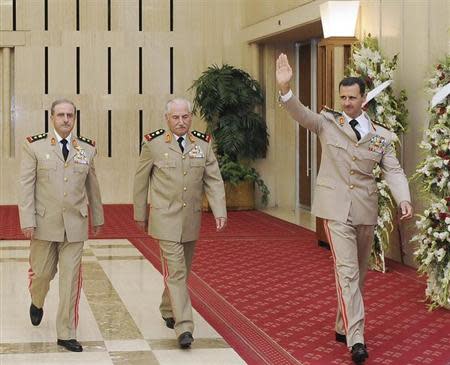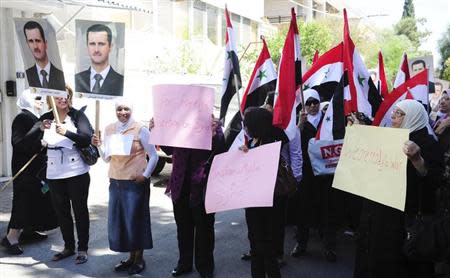Assad ally said to defect, Putin chides U.S. on Syria
By Khaled Yacoub Oweis and Amena Bakr AMMAN/DOHA (Reuters) - General Ali Habib, a former Syrian defence minister, has become the most senior member of President Bashar al-Assad's ruling Alawite sect to defect, opposition figures said on Wednesday, as Washington debated a military strike on the war-racked country. Habib had been under house arrest since he resigned in protest at Assad's crackdown on demonstrators in 2011 but had reached the Turkish border late on Tuesday with Western help, Kamal al-Labwani of the Syrian National Coalition told Reuters. Other sources also said Habib had fled but Syrian state television denied he had left his home. Turkey's foreign minister said he could not confirm the general had defected. Washington and Syria's main backer Russia remained publicly at odds over U.S. plans for a possible military strike but both raised the prospect of easing the deadlock when President Vladimir Putin hosts world leaders at a G20 summit on Thursday. U.S. President Barack Obama said he would continue to try to persuade Putin of the need for punitive strikes on Assad for using chemical weapons when the two meet in St. Petersburg. But Putin again questioned Western evidence. He accused U.S. Secretary of State John Kerry outright of lying when, in urging Congress to approve strikes on Syria, Kerry played down the role of al Qaeda in the rebel forces. "Al Qaeda units are the main military echelon, and they know this," Putin said. "He is lying and knows he is lying. It's sad." Having surprised friends and foes alike by seeking approval from Congress before attacking, Obama has been working to build support at home and abroad. In Stockholm en route for Russia, he appealed to lawmakers' consciences: "America and Congress's credibility is on the line," he said. "The question is how credible is Congress when it passes a treaty saying we have to forbid the use of chemical weapons." In Washington the U.S. Senate Foreign Relations Committee approved a resolution authorizing the use of military force in Syria, clearing the way for a vote on the resolution in the full Senate, likely next week. Obama is also seeking approval from the Republican-led House of Representatives. Earlier, Putin had said in a pre-summit interview with the Associated Press that he could not absolutely "rule out" Russia supporting a U.N. Security Council resolution to punish Assad - if it could be proved he had used poison gas. Briefing members of congress in Washington on Wednesday, Kerry said those comments were "hopeful" and "there may be a road forward where Russia would consider not blocking action." A senior Western official said that, while Moscow was unlikely to say so in public, there were signs Russian officials believe Assad was indeed responsible for the deaths on August 21 and that it had strained Russian support for him - providing an opening for a new, concerted drive to end the conflict. However, Putin's characteristically blunt tone towards the U.S. position appeared to limit prospects for a breakthrough in a stalemate that has prevented international action to rein in a conflict that has killed more than 100,000 Syrians and left millions homeless but which neither side has been able to win. "DEFECTION" The rebels, largely drawn from Syria's Sunni Muslim majority, have captured big swathes of territory and won backing from Gulf Arab states such as Saudi Arabia, as well as from Turkey and Western powers. But Assad, armed by Moscow and backed by Shi'ite Muslim Iran, has held on in Damascus and elsewhere. Christians, Kurds and others, as well as Western leaders, are wary of Islamist militants among the rebels. Assad's fellow Alawites, an offshoot of Shi'ite Islam, fear annihilation if he loses and provide the backbone of the president's armed forces. Numerous defections over the past two years by senior commanders, either to the rebel Free Syrian Army or into exile abroad, have not led to a collapse of Assad's defences. But the flight of Habib, if confirmed, would lend credibility to suggestions that parts of the Alawite community may be turning against Assad. Previous high-level defections have generally involved Sunni officers. "Ali Habib has managed to escape from the grip of the regime and he is now in Turkey, but this does not mean that he has joined the opposition. I was told this by a Western diplomatic official," the SNC's Kamal al-Labwani said from Paris. A Gulf source told Reuters that Habib had crossed the Turkish frontier late on Tuesday with two or three other people. He was then taken across the border in a convoy of vehicles. Kerry said he did not know if the report of Habib's defection was correct but "there are currently defections taking place, I think there are something like 60 to 100 in the last day or so, officers and enlisted personnel." Born in 1939, Habib was defence minister from June 2009 to August 2011 and has also served as Chief of the General Staff of the Syrian Army. He is from the port city of Tartus. Some opposition sources say that Habib disagreed with the use of force against protesters at the start of the revolt in 2011. Those sources say he was dismissed. He later said publicly that he had left the post for health reasons. "Habib is a simple and honest. Unlike the Assads he is not corrupt," said a military defector who served under Habib. "His defection will rattle the Alawite community because it will be seen as another man jumping off a sinking boat, indicating the coming fall of the regime." Predictions of the imminent collapse of the four-decade-old Assad dynasty, including by Western leaders, have turned out to be wishful thinking before. Recently, the alleged use of poison gas has been cited as evidence of desperation in the Assad camp. The head of German intelligence told members of parliament this week that German agents had recorded a call between the Iranian embassy in Damascus and a senior figure in Hezbollah, the Lebanese Shi'ite militia, which, the agents believe, betrayed a lack of confidence among these two key Assad allies. A person who attended at the lawmakers' briefing on Monday said the material was presented as evidence of Assad's role in the release of poison gas in rebel-held suburbs of Damascus on August 21. But it also indicated doubts about Assad's tactics. The Hezbollah official said Assad was wrong to order the gas attack and that it indicated he was losing his nerve. Germany has ruled out joining any military action in Syria. MILITARY PLANS Following the failure of British Prime Minister David Cameron to win parliamentary backing for air strikes last week, France and Turkey are the only military powers lining up behind Obama. The French parliament debated Syria on Wednesday, though President Francois Hollande does not need approval for action. His foreign minister, Laurent Fabius, said using force against Assad could pave the way for a new round of diplomacy. French Prime Minister Jean-Marc Ayrault told parliament that failure to strike Assad would send a message to the likes of Iran and North Korea that they could defy Western powers with impunity, notably over concerns about their nuclear programmes. Obama has won the backing of key figures in the U.S. Congress, including among his Republican opponents. The administration is trying to balance the views of many in Congress who want a narrowly defined resolution explicitly ruling out ground troops against calls from hawks such as Senator John McCain, who has pushed for a broader resolution that would allow direct U.S. support for Syrian rebels. In the Senate, Democratic leader Harry Reid is guardedly confident that a majority of the 100 members will vote yes, but is still unsure if he can get the 60 votes needed to overcome Republican procedural roadblocks, aides said. In the 435-member House, a senior Republican aide predicted that most of the 50 or so Republicans backed by the anti-big government Tea Party movement will vote no. A number of Democratic liberals are also expected to vote against a resolution, placing the final outcome in doubt. U.S. Defense Secretary Chuck Hagel told a hearing of the House of Representatives Foreign Affairs Committee that he thought "the likelihood is very high" that Assad would use chemical weapons again unless the United States took action to make clear use of the weapons was unacceptable. Kerry agreed, saying he thought it was "100 percent" likely. (Additional reporting by Laila Bassam, Yara Bayoumy and Erika Solomon in Beirut, Paul Taylor and John Irish in Paris, Alexandra Hudson in Berlin, Thomas Grove and Darya Korsunskaya in Moscow and David Alexander and Susan Cornwell in Washington, Steve Holland and Matt Spetalnick in Stockholm; Writing by Alastair Macdonald and Claudia Parsons; Editing by Giles Elgood)


